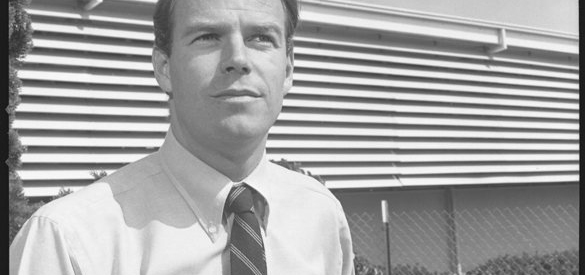In 1967, a teacher from Palo Alto radicalised his students into a fascist party in five days. Here?s what he taught humanity that week.
 Ron Jones (1967) CREDIT: Paloaltoonline.com
Ron Jones (1967) CREDIT: Paloaltoonline.com
?Why did the German people let the holocaust happen??. This question is one often asked of history teachers by their inquisitive students. It?s a valid question and doesn?t have a simple soundbite answer. The reasons sit deep in the complexity of human psychology.
For Ron Jones, the answer was to show his students and not tell them. It was 1967 at Cubberley High School in Palo Alto California. Jones was a popular teacher, a recent Stanford graduate who ran engaging classes.
His students would frequently skip other classes to come and sit on his fun and imaginative lectures.
What transpired in this Californian classroom would resonate around the world. Jones would teach all his students and the rest of the world a very important lesson about fascism. It would later be called ?The Third Wave? experiment. Jones was clear, history can repeat itself, but sometimes it does under controlled conditions.
This is exactly what happened across one week in April 1967.
The ?Third Wave? Experiment
Monday ? Jones establishes his authority
Jones? bubbly persona gave way to something a little more stern on Monday morning. He ordered the students to call him ?Mr. Jones?. He followed this with a strong lecture about the benefits of discipline. The class was drilled in how to sit and stand to attention. According to Jones, his idea was simple. He was giving the children first-hand experience of what it was like to operate under a totalitarian regime.
This was where he?d imagined the experiment would end. He was wrong.
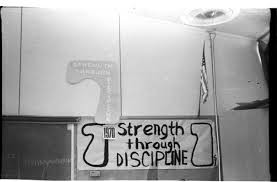
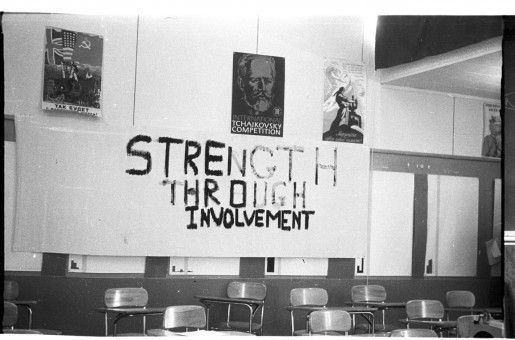
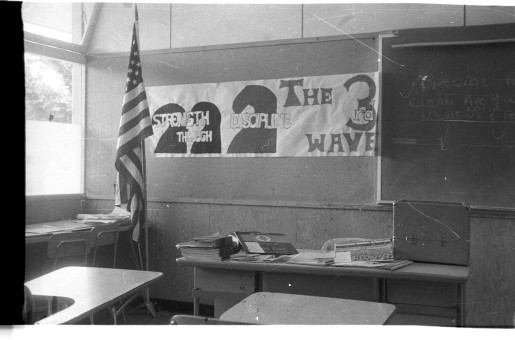 Cubberly High School. CREDIT: Paloaltoonline.com
Cubberly High School. CREDIT: Paloaltoonline.com
Tuesday ? Slogans and salutes
The following day the students were back in their seats, sat at attention, alert and ready. Jones did a double take upon arrival, ever the improviser he then wrote ?Strength Through Discipline? on the board. He followed this with ?Strength through Community?. The movement was underway. These phrases would go on to the group slogan and chants.
Those in the Contemporary History class faced a decision. He told them if they participated in his movement they would receive an A grade. If they went along with the movement but didn?t fully take part that they would get a C grade. If they tried to revolt he would send them to the library for the duration of the class and they would fail with an F.
Jones invented a salute, a cupped hand moving across the chest to the opposite shoulder. This salute was compulsory. It was to be given to party members both inside and outside of the classroom. The movement was also given a name. ?The Third Wave?. Silence fell as the bell rang for the end of lesson and Jones saluted the class.
Chillingly reminiscent of the Nuremberg rally, the class saluted back in perfect unison.
Wednesday ? The establishment of the secret police
The group of thirty had expanded to forty-three by Wednesday. Students from other classes had heard about ?The Third Wave? and were keen to get involved. Jones issued membership cards, appointed some select students to be his elite bodyguard. Members of the Third Wave got instructions on how to recruit new members.
Mr. Jones then instructed the students to put their heads down on the desk and close their eyes. He tapped three of them on the shoulder. These three students then became ?secret policemen?, duty bound to report any deviation from the rules to Jones. Students were banned from congregating in groups of more than three.
The secret police would inform Jones of any transgressions and a show trial would follow. The accused stood at the front of the class, Jones would read the charges and presume guilt. He would ask the accused to explain themselves before starting a ?guilty? chant. Being found guilty meant ostracism from the group and Jones began to suggest that it might mean expulsion from the college itself. Fear ran amok.
Thursday ? The announcement of the ?bigger picture?
After a student followed Jones into the staffroom, a colleague tried to throw them out. The student retorted that they were Mr. Jones? personal bodyguard. It was at this point that Jones realised that the experiment was becoming far too real for the children. Things were getting out of hand.
Students from other schools in the area began skipping their classes to join ?The Third Wave?. Jones made the decision to end the experiment himself. Knowing that it would need to culminate in a decent lesson for all those involved, he decided to double down.
He told the students that they were part of a national movement called ?The Third Wave?. They would be part of a political group that would revolutionise American politics. There was an excitement. Tomorrow, he told them, over 1000 youth groups would stand up and pledge allegiance to the leader. There would be a rally at midday and only members could attend.
Quite by accident, an advert for Lumber in Time Magazine featured a poster saying ?The Third Wave is coming?. The children seized upon this as a sign that gave legitimacy to Jones? claims. Things were getting serious.
To reinforce his control he demonstrated his power. He had three dissident girls escorted to the library under ?house arrest?. They were the girls who had questioned the validity of the movement early on. He banned them from the rally, everyone else was still invited.
Friday ? The Third Wave rally
At midday, the students arrived for the rally. They had banners and were chanting the slogans. There were now over 200 members of the Third Wave taken from students in three local schools. Jones did one last inspection of his troops. Getting the students to repeat in increasing volume the mantra.
?Strength Through Discipline?
At 12:05 Ron Jones turned on the television. For two minutes it played only static, lighting the children with an eerie glow. At 12:07 the children began to realise that there was no leader. There was no national movement. There was an air of disappointment.
Jones told them that there was no leader, that they had been used and manipulated. He told them how they?d been shoved by their own desires for power into an uncomfortable situation. He told them that they bargained away their freedom for the comfort of discipline.
He told them that the lure of feeling superior was what made them attend the rally. He told them they probably felt they could leave at any time. Then he pointed out that none of them had. He asked them how far they would?ve gone. How far could they have been pushed?
And with that Jones projected a video onto the wall featuring clips of the Nuremberg rally, the concentration camps and the rise of the Third Reich. Many of the students started to cry, some from shock, some from relief. The lesson was both powerful and profound.
The aftermath
The following week, the class learned about Vietnam. The social experiment was gone but not forgotten. Over a decade later Ron Jones had a chance encounter with one of his students in Berkeley. Recognising him immediately, the ex-student gave him the cupped hand salute. It struck Jones that he might have had a greater impact on his students than he first imagined.
He wrote down details of his experiment in the magazine Whole Earth Review. His story was retold as a novel in 1981, and two movie versions came out that same year. In 2008 the story hit the screens in the German film ?Die Welle? (The Wave). In 2011 a documentary called ?The Lesson? was released. It followed the story of the Third Wave and was created by Phillip Neel, one of the original students in the party.
The ?Third Wave Experiment? is now taught on Psychology courses around the world and is on the curriculum in Germany and Israel.
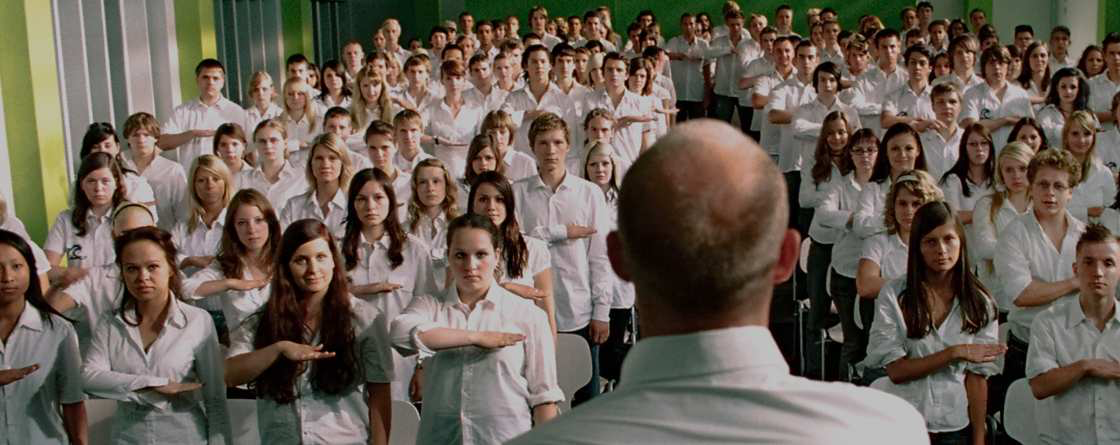 Die Welle: CREDIT imgcop.com
Die Welle: CREDIT imgcop.com
What does the ?Third Wave? mean for us today?
What Ron Jones accomplished in his week-long ?Third Wave? resonated around the world. It was a microcosm of the appeal of demagogues. It still has plenty to say about the modern world and our ability to resist the creep of fascism.
Jones noticed that often the most popular and academic students were expelled first. This movement appealed to the quiet middle. Those students teachers often miss because they don?t stand out. When loyalty and obedience are the currency of success, those who don?t question float to the top. Academic students found themselves expelled very early on.
I am a big question asker. I stood up by my desk and said ?Mr. Jones, why can?t we just say what we think? Why can?t we just express our opinions of what we think about the Third Wave?? And at that point, he said, ?You to the library for the rest of the semester?.
Sherry Tousley, Interview in ?The Lesson? (2011)
Sherry had mounted an active resistance campaign after being expelled from the Third Wave on day two. She got her Dad to drive her into school early so she could hang posters where they couldn?t be torn down.
Whilst a few others thought about joining the resistance, most chose not to. They were afraid of sharing her fate, being given an F-grade and banishment to the library. The Third Wave didn?t target the best students, it targeted those already marginalised. Those for whom the system wasn?t working. Does this sound familiar?
Indoctrination in the digital age
We see this happening in the world around us. Whilst the technology has moved on, the psychology hasn?t. There has been a huge increase in personality movements which rely on a ?with us? or ?against us? mentality. The messages of MAGA and Brexit may be very different from #MeToo and #NoPlatform but they are two sides of the same coin.
Followers often exhibit rigid thinking in which they position themselves as morally right. They don?t want to engage in conversation. You are either with them or against them. There?s no space for nuanced debate, many people are ?sent to the library? for daring to question the received wisdom.
The right open Concentration Camps, the left open Gulags. They are identical experiences for the people inside.
Having strongly held beliefs about how the world should be doesn?t make you a fascist. But an inability to question your beliefs leaves you open to exploitation by demagogues. When your beliefs become weaponised against others, that?s when fascism can begin its inexorable creep.
Like the students in Palo Alto, you may find yourself succumbing to a lack of questioning. If you?re chanting ?lock her up? at political rallies then it might be time to think about what you?re calling for. Likewise, if you?re determined to ruin the career of a man because you have decided guilt prima facie. These are things that should make you stop and think.
We have engineered a society in which public opinion is fast replacing the law courts. Our movements, our political biases, our friendships, and our feelings are published daily. Usually by us, but not always. Join me in a dystopian subjunctive. Imagine what the Nazi party could have accomplished with access to Facebook and Twitter.
We have provided enough scaffolding for a sufficiently intelligent and ambitious fascist regime to take hold. Whether that regime springs from the nationalistic right or the ideological left is still up for debate.
Those students 51 years ago failed to notice they were getting swept up in a story. We must learn the lesson they understood only on Friday afternoon. When the pleasure of belonging outweighs your ability to question you must force yourself to recalibrate.
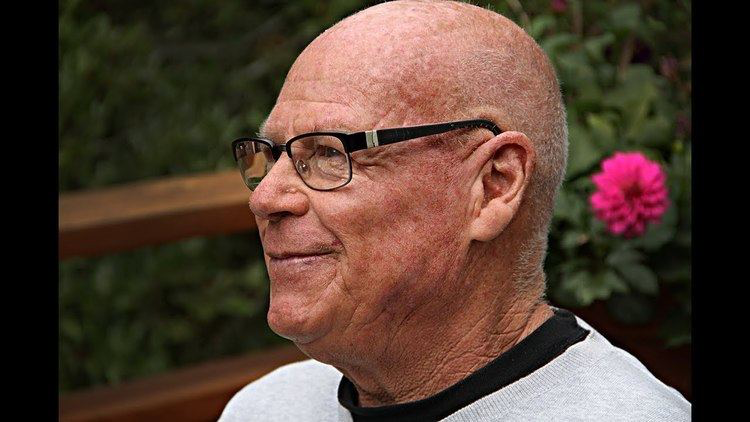 Ron Jones (2014) CREDIT: Alchetron.com
Ron Jones (2014) CREDIT: Alchetron.com
In an uncertain world, it feels good to have certainties. Understand though, our psychologies are flawed and hacked with ease. It took five days for one imaginative history teacher to radicalise a class of students. Ron Jones taught the world how easily we can be exploited.
For that warning which has echoed down the ages, we should be eternally grateful.
But what about you? Will you have the courage to be sent to the library with an F-Grade when the time comes? Will you be like Sherry Tousley hanging dissenting posters in the digital hallway? Or will you find yourself standing at a cyber-rally, chanting slogans and feeling like you have no other choice?
If you enjoyed reading this article, you may also enjoy these too
